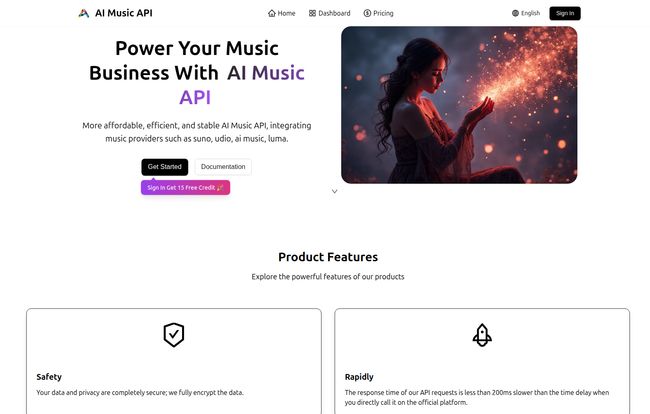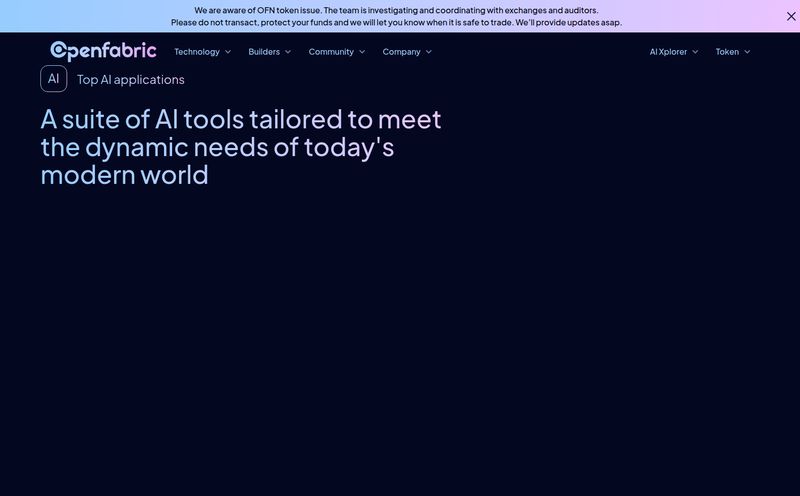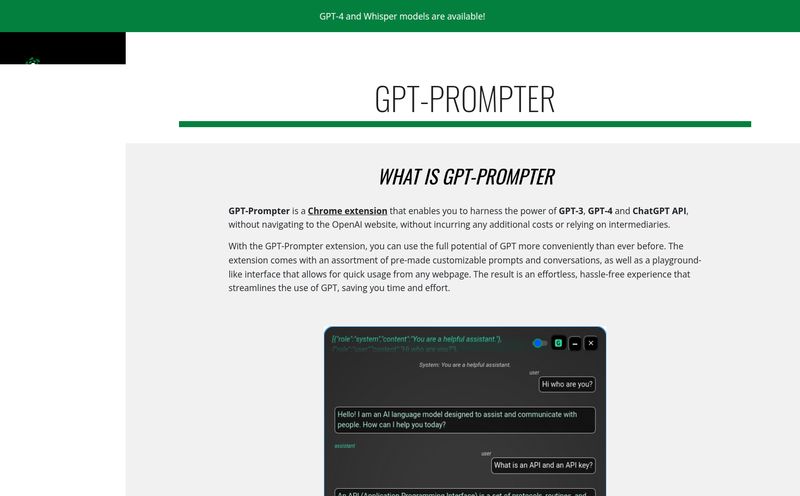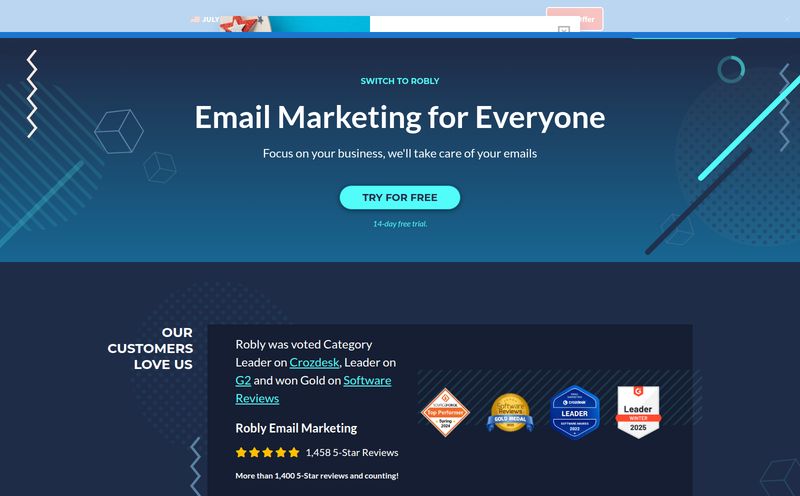If you're in the tech or creator space, you've seen it. The explosion of AI-generated music is impossible to ignore. Tools like Suno and Udio are dropping jaws, creating everything from lo-fi beats to full-blown sea shanties about, I don't know, SEO keyword research. It's wild. And for developers like us, the first thought is always the same:
How can I build something with this?
The problem? Getting direct, reliable, and affordable API access to these cutting-edge models can be a nightmare. It’s either incredibly expensive, invite-only, or just… not available. I've been down this rabbit hole more than once. So when I stumbled upon a platform called AI Music API (found at udioapi.pro), my professional skepticism immediately kicked in. But so did my curiosity.
Their claim is bold: one simple API to access top-tier music models, but at a fraction of the cost. Is it too good to be true? Or is this the shortcut we've all been waiting for? I had to dig in.
So, What Exactly is This AI Music API?
Think of this platform as a universal remote for AI music generation. Instead of trying to wrangle separate integrations for Suno, Udio, Luma, and whoever else pops up next week, this API consolidates them. You send one request to their endpoint, and they handle the messy business of talking to the different providers on the back end. It's an aggregator, a middleman, a music-making-maestro-for-hire.
The whole pitch is built on three pillars you can see plastered on their site: it's supposedly more affordable, efficient, and stable than going it alone. For any developer who's ever dealt with a flaky third-party service or a budget-conscious client, those words are music to our ears. No pun intended. Well, maybe a little.

Visit AI Music API
The Features That Actually Matter to Developers
Let's cut through the marketing fluff. Websites can promise the world. What I care about are the specs that affect my code and my wallet. This is where things get interesting.
Let's Talk Price: The 800-Pound Gorilla
The headline claim is that it's just 20% of the official call price. That's a staggering discount. How? I suspect it's by buying credits or services in massive bulk, a bit like the Costco of AI API calls. They pass the savings on to you. For an indie developer or a small agency trying to add AI music features to an app without breaking the bank, this is a massive deal. The economics of your project change completely when your biggest variable cost gets slashed by 80%.
It turns a feature that might have been a "nice-to-have" luxury into a totally viable part of your MVP. And that, right there, is often the difference between a project getting launched or staying on the drawing board.
Speed and Uptime: Keeping Your App Alive
Price is nothing if the service is slow and unreliable. The site claims their API response times are less than 200ms slower than the official platform, which, frankly, is impressive. In the real world, that's a delay your users will never, ever notice. They also boast a 99.9% uptime thanks to load balancing across their servers. As someone who has been woken up at 3 AM by a PagerDuty alert for a down service, I don't take uptime claims lightly. That 99.9% is a promise of sleep, and I value my sleep.
Security Isn't Just a Buzzword Anymore
They mention data encryption and privacy compliance. It’s standard stuff, sure, but it's a box that needs to be checked. In an age of constant data breaches, knowing that your requests and the generated content are handled securely is a basic requirement. Glad to see they mention it.
A Look at the Pricing Structure
So, how do you actually pay for this thing? They've got a few different tiers, which I appreciate. Flexibility is always good. Let's break it down in a simple way:
| Plan Type | Cost | Credits | Best For |
|---|---|---|---|
| Weekly | $29.9 | 3,990 | Short-term projects or just trying it out. |
| Monthly | $159.9 | 25,990 | Regular users. They call it the 'most popular' and it offers more credits for your money. |
| Yearly | $569.9 | 106,990 | Heavy users and businesses who want to save the most in the long run. |
| Pay As You Go | $10 | 1,000 | Hobbyists or those with very infrequent needs. No commitment. |
In my opinion, the Monthly plan hits the sweet spot for most serious projects. The bonus credits make it a better value than the weekly plan if you know you're going to have consistent usage. The 'Pay As You Go' option is perfect for weekend experiments, which I love to see. It lowers the barrier to entry to practically zero. No need to commit to a subscription just to see if your crazy idea for a cat-video-soundtrack-generator will work.
The Not-So-Shiny Parts (Let's Be Real)
Alright, it can't all be sunshine and AI-generated rainbows. Every service has its trade-offs, and this one is no different. You have to go in with your eyes open.
The Copyright Conundrum
This is the big one. The platform is very clear that you, the user, are responsible for handling the copyright of the generated music. This API is a tool, a powerful one, but it's not a law firm. The entire field of AI and copyright is a legal minefield right now, with ongoing lawsuits and debates. Using this service means you're taking on the risk. For personal projects or internal tools? Probably fine. For a major commercial release? You're going to want to talk to a lawyer. This isn't a flaw of the platform, per se, but a reality of the technology it's built on.
A Bit of a Black Box?
The flip side of the "universal remote" simplicity is a lack of granular control. The documentation is a bit light on the specifics of the underlying models. Are we using Suno v3 or v2? What specific parameters are exposed? If you're a power user who needs to tweak every little detail, you might find teh abstraction a little limiting. It’s a classic trade-off: convenience versus control. For 90% of users, convenience wins every time. But it's something to be aware of.
Who Should Actually Use This API?
I see a few clear winners here.
- The Indie App Developer: You're a one-person shop or a small team. You want to add a cool AI music feature to your app without spending months on integration or thousands on fees. This is practically built for you.
- The Content Creator Agency: You need quick, custom, royalty-free-ish background music for social media videos, podcasts, or ads. This API could let you build an internal tool to churn out tracks on demand, saving a ton on stock music subscriptions.
- The Hobbyist & Tinkerer: You just want to play. The Pay As You Go model is your sandbox. Go build something weird and wonderful.
Who might want to pause? A massive enterprise like Adobe or Spotify would likely want to go directly to the source, negotiate their own deals, and have dedicated support channels and SLAs. But for the rest of us, this is an incredibly compelling option.
Frequently Asked Questions about the AI Music API
- How does this whole AI music generation thing work?
- In short, you send a text prompt through the API—like "a funky synthwave track for late-night coding"—and the AI model interprets it to compose and generate a unique audio file. This API just makes the process of sending that prompt and getting the audio back much easier and cheaper.
- Is the music generated here safe to use commercially?
- This is the million-dollar question. The platform states you're responsible for copyright. While the generated music is unique, the models were trained on existing music, creating a legal gray area. For low-stakes commercial use (like a social media video), many people accept the risk. For a feature film or a major album release, consult a legal expert.
- What music models can I actually access through this API?
- They integrate with major providers like Suno and Udio. The exact versions or specific model names aren't always detailed, as the API focuses on providing a unified, simple experience rather than deep technical control over each provider.
- How does the pricing compare to calling Suno or Udio directly?
- Direct API access to these platforms is often limited or more expensive. This API's main value proposition is offering access at what they claim is about 20% of the cost, likely due to bulk purchasing. This makes it far more accessible for smaller developers.
- Is it complicated to integrate into my project?
- Not at all. That's the main appeal. It’s a standard REST API. If you've ever integrated any third-party API (like Stripe for payments or Twilio for messages), you'll feel right at home. The process is designed to be quick and painless.
So, What's the Verdict?
After digging through it, I'm genuinely optimistic. The AI Music API feels like a classic disruptor. It's not perfect, and it operates in a legally fuzzy space (thanks to the state of AI, not their own fault). But it solves a very real problem for a very large group of people: making powerful AI music generation accessible and affordable.
It democratizes a technology that was, until recently, out of reach for most. Yes, you trade some control and you take on the copyright risk. But in return, you get speed, simplicity, and a price point that can't be ignored. For developers and creators looking to innovate without a FAANG-level budget, this might just be the most important tool you'll find this year. I, for one, am already thinking about what to build with it.



